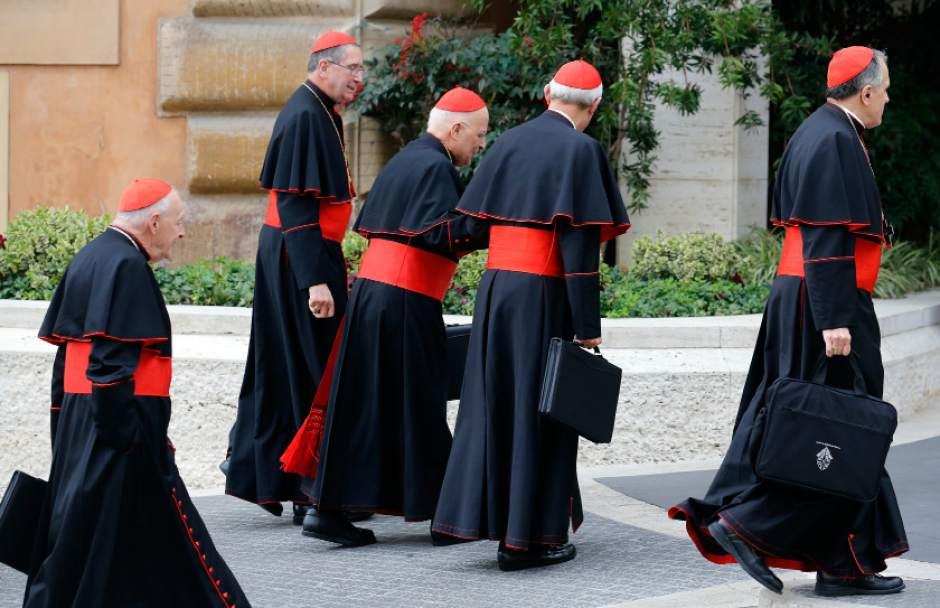2 Cardinals with Pittsburgh Roots Say Document Scandal to Be Addressed
By Betsy Hiel
ROME – Two American cardinals with Pittsburgh roots said Roman Catholic officials will closely examine the church's troubles before choosing a pope. Cardinals Daniel DiNardo of Galveston-Houston and Sean O'Malley of Boston stepped from a College of Cardinals' meeting on Tuesday to talk with reporters about church operations, including a scandal that embarrassed the resigned Pope Benedict XVI. Terrence Tilley, Fordham University's theology department chairman and a professor of Catholic theology, described their remarks as “unusual.” “They are sending a message,” he said. DiNardo, 62, grew up in Castle Shannon, graduated from Duquesne University's St. Paul's Seminary, and was a priest at St. Pius X in Brookline and Madonna del Castello in Swissvale. O'Malley, 68, grew up in the South Hills, attended elementary schools in Pittsburgh and ae_SNbSSt. Fidelis Seminary in Herman, Butler County. Both addressed problems involving the Curia, the centuries-old Vatican bureaucracy beset by scandal. DiNardo said the Curia's work must be examined “attentively.” “There is certainly a lot of reflection going on throughout the Catholic world about the governance of the church and how to improve it,” O'Malley said. In the most recent scandal – dubbed “Vati-leaks” by the Italian press – Pope Benedict's butler was arrested for leaking stolen documents that allegedly detailed financial corruption and criminal activity inside the Curia. Benedict reportedly directed three cardinals to investigate and to give their findings to the next pontiff. “The ‘Vati-leaks' grabbed the headlines for a long time,” O'Malley said. “But I don't know how important those issues are for the work of the conclave.” He said he was confident that cardinals will share “the information that is really germane” as they select a pope. Fordham's Tilley believes the two cardinals “are sending a message that this opacity is a detriment, not an asset, to the Vatican bureaucracy.” “I think it is very clear that we need a pope who will clean up the mess, which most of us suspect is a part of the cause of Benedict's resignation,” he said. Unlike the two Americans, he said, cardinals have been reluctant to deal with the media. “Given that the pope is not deceased but resigned, given the level of discomfort with the Curia and other scandals, and given the inept use of the media over the past pontificate, I am not surprised that the cardinals are briefing the media rather than avoiding them,” he said. Both cardinals said they are unlikely candidates for the papacy. “That's an ‘Alice in Wonderland' story, going down the rabbit hole,” joked DiNardo. Both said they could not divulge what cardinals discussed, but they explained the process. Not all of the 115 cardinals who will vote in the conclave have arrived. No date for the conclave has been set. DiNardo said the cardinals are addressing each other in formal speeches and informally over coffee. He said the mood has been “serene” since the meetings began Monday. Tilley said strong candidates for pope may emerge in those informal discussions. “It is always possible that the king-makers are already at work,” he said, and an unexpected late-afternoon session “suggests that the people who want to get down to business have won a small battle.” DiNardo said the pre-conclave meetings, known as general congregations, “help the cardinals to understand a little bit about the dimensions of what is going on in the church worldwide and locally. “We want to make sure there is plenty of time to discuss, but we also want to get the voting under way so we can get back to Holy Week at our dioceses.” O'Malley said the cardinals “want to have enough time so that when we get to the conclave itself, it is a time of decision. The general congregations are a time of discernment. “This is the most important decision that some of us will ever make.” Contact: bhiel@tribweb.com
|
.
Any original material on these pages is copyright © BishopAccountability.org 2004. Reproduce freely with attribution.
